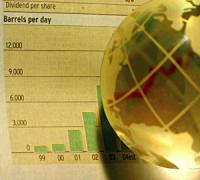Economists no longer debate the realities of anthropomorphic climate change–that’s so 1993!
Instead, they squabble over how much we should be spending today to lessen the sting of the much bigger invoices that will inevitably come due tomorrow, should we insist on carrying on with all this fossil-fuel nonsense.
To do their apocalyptic calculus, they attach hard–and rather large–numbers to phenomena such as rainforest loss, and plug them into cost-benefit analysis models. In the end, the bean counters determine a so-called social cost of carbon, and recommend a percentage of GDP for present-day investments in clean-energy research and the like.
Until now, the economic models have not included “unlikely but extreme events,” such as a global temperature rise of–gulp!–six degrees, mostly because Sir Nicholas Stern and friends have dismissed them as simply too remote a possibility to justify making significant present-day investments.
Not any more.
New Scientist magazine (article firewalled) reveals this month that Harvard University economics professor Martin Weitzman has developed the first thorough method for including such unlikely but extreme events in cost-benefit analyses.
His paper isn’t even out yet, but word of his results is spreading like pine beetle through the economics community:
“When you take into account extreme temperature rises… [Weitzman] says, they dominate all other options and effectively demand that investment aimed at stopping them be made now”
Even Richard Tol is lining up behind Weitzman’s findings.
The Irish economist, who had, in the opinion of many, long low-balled the amount that should be spent to prevent the release of one tonne of CO2, dramatically adjusted his math. Before reading Weitzman’s paper, New Scientist reports, Tol had priced carbon at $5 a tonne. Now, he thinks it should be closer to $50. “This work shows we’re simply doing it wrong,” the impressively-coiffed Dubliner tells the magazine.
No kidding.
Note: see our welcome to DeSmog’s latest writer James Glave – this is his first post so be gentle!
If you enjoyed this post, please vote for it here on Digg.com.
Subscribe to our newsletter
Stay up to date with DeSmog news and alerts






